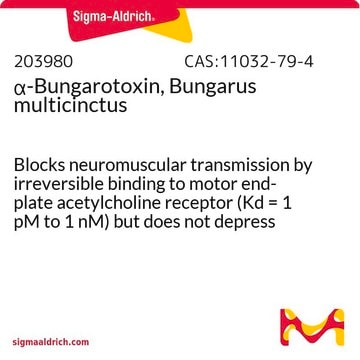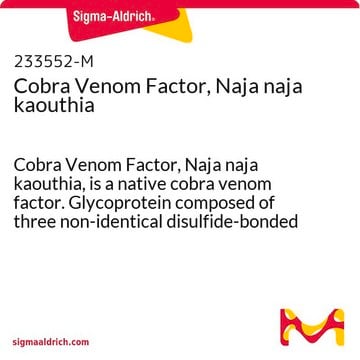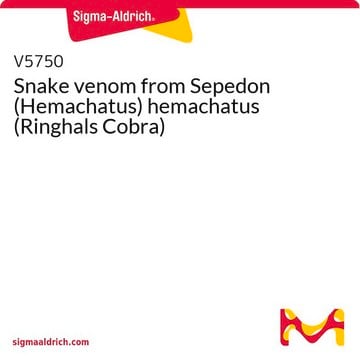T0195
α-Bungarotoxin-tetramethylrhodamine from Bungarus multicinctus (Formosan Banded Krait)
Synonym(s):
TMR-α-BTX
Sign Into View Organizational & Contract Pricing
All Photos(1)
About This Item
Recommended Products
Application
α-Bungarotoxin-tetramethylrhodamine from Bungarus multicinctus was used at a dilution of 1:220 to identify the distribution of nicotinic acetylcholine receptors at neuromuscular junctions of longitudinal sections of rat gastrocnemius muscle.
α-Bungarotoxin-tetramethylrhodamine from Bungarus multicinctus (Formosan Banded Krait) has been used in immunofluorescence staining (1:200) for identification of neuromuscular junction in experimental models. It has also been used to block muscle contraction in myotome cells.
Biochem/physiol Actions
α-Bungarotoxin is a high-affinity antagonist for nicotinic acetylcholine receptors (AChRs) from muscle but not the neurons. Labeling α-Bungarotoxin with tetramethylrhodamine enables the detection of bungarotoxin-binding receptors at neuromuscular junctions.
Useful for detecting the distribution of nicotinic acetylcholine receptors at neuromuscular junctions.
Storage Class Code
11 - Combustible Solids
WGK
WGK 3
Flash Point(F)
Not applicable
Flash Point(C)
Not applicable
Personal Protective Equipment
dust mask type N95 (US), Eyeshields, Gloves
Certificates of Analysis (COA)
Search for Certificates of Analysis (COA) by entering the products Lot/Batch Number. Lot and Batch Numbers can be found on a product’s label following the words ‘Lot’ or ‘Batch’.
Already Own This Product?
Find documentation for the products that you have recently purchased in the Document Library.
Customers Also Viewed
Anna L Gray et al.
Disease models & mechanisms, 13(5) (2020-03-11)
Spinal and bulbar muscular atrophy (SBMA), also known as Kennedy's Disease, is a late-onset X-linked progressive neuromuscular disease, which predominantly affects males. The pathological hallmarks of the disease are selective loss of spinal and bulbar motor neurons, accompanied by weakness
S Rakhilin et al.
The Journal of cell biology, 146(1), 203-218 (1999-07-14)
Neuronal nicotinic alpha7 subunits assemble into cell-surface complexes that neither function nor bind alpha-bungarotoxin when expressed in tsA201 cells. Functional alpha-bungarotoxin receptors are expressed if the membrane-spanning and cytoplasmic domains of the alpha7 subunit are replaced by the homologous regions
Sara Bachiller et al.
Molecular neurobiology, 55(12), 8856-8868 (2018-04-01)
A missense mutation in HERC1 provokes loss of cerebellar Purkinje cells, tremor, and unstable gait in tambaleante (tbl) mice. Recently, we have shown that before cerebellar degeneration takes place, the tbl mouse suffers from a reduction in the number of
Brian T Feeley et al.
The American journal of sports medicine, 48(11), 2660-2668 (2020-07-31)
The muscle quality of the rotator cuff (RC), measured by atrophy and fatty infiltration (FI), is a key determinant of outcomes in RC injury and repair. The ability to regenerate muscle after repair has been shown to be limited. To
Young-Tae Kim et al.
Biomaterials, 29(21), 3117-3127 (2008-05-02)
Peripheral nerve regeneration across long nerve gaps is clinically challenging. Autografts, the standard of therapy, are limited by availability and other complications. Here, using rigorous anatomical and functional measures, we report that aligned polymer fiber-based constructs present topographical cues that
Our team of scientists has experience in all areas of research including Life Science, Material Science, Chemical Synthesis, Chromatography, Analytical and many others.
Contact Technical Service










